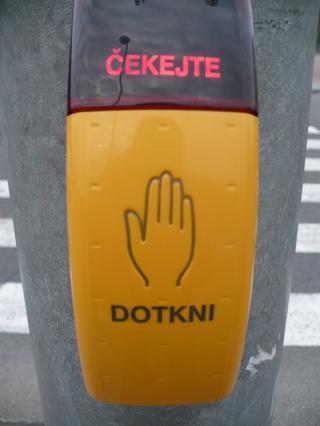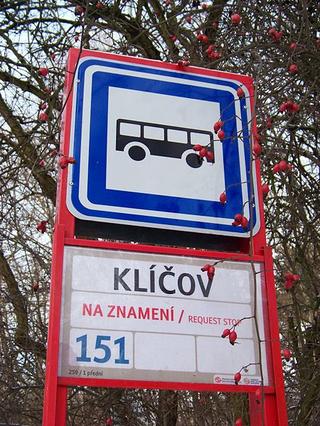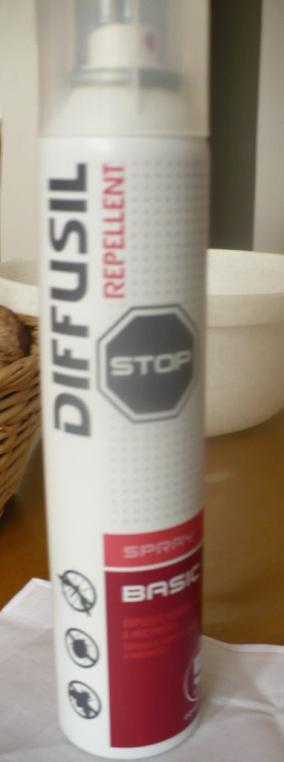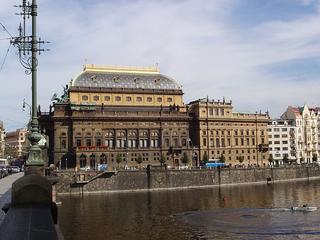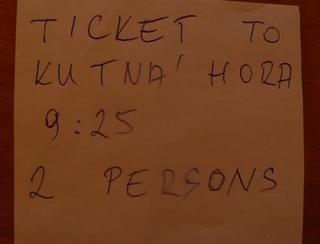What to Be Careful About
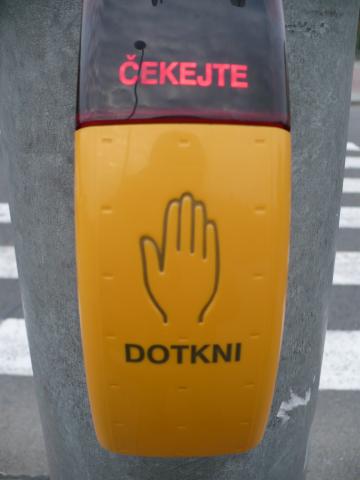
Every guidebook will tell you:
“Drive on the right in the Czech Republic.”
“The emergency number is 112.”
But what is it that will really save you a lot of trouble?
Shops
- It’s a Czech tradition not to work on weekends, if possible. We work long hours on workdays, but Sunday family lunch is sacred. As a result, almost all small shops close on Saturdays at 11 a.m. for the weekend. If you plan to spend some time in the Czech Republic, find some back-up supermarkets and pharmacies that stay open for the weekend.
- Some supermarkets want you to weigh your own fruit and vegetables, while some have scales at the cash-desks and the shop-assistants weigh them for you. I personally never remember which supermarket weighs the fruit for you and which doesn’t :-) So just look for the scales in the fruit section, and if they’re not there, you will get your fruit weighed for you. Or, if there’s a sign containing the words “u pokladny”, that means you’ll get your fruit weighed at the cash-desk.
- We love our currency, Czech crown (“koruna”). That’s probably why we still don’t have euro and why it’s not possible to pay with a credit card in many shops. It’s better to have some cash with you at all times.
- It’s difficult to remember all the values
of the coins, but the good news is: there aren’t any cents (“haléře”)
anymore :-) The prices still look like this: 39.90, 25.50 etc., but the sum
gets rounded up to a whole number at the cash-desk.
What might help you remember the values:
The coins and bank notes that have number “2” in their value always stand out. 2-crown and 20-crown coins aren’t perfectly round—they have these tiny corners on them:
And the 20-crown coin and 200-crown bank note have bright yellow and bright orange colours.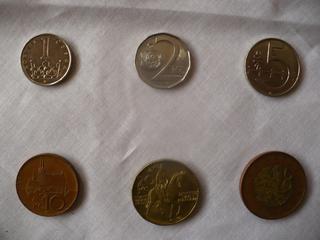
Coins: 1, 2, 5, 10, 20, 50 crowns
By the way, if someone gives you a 20- or 50-crown bank note, don’t accept them! They aren’t in use anymore.
Walking and Public Transport
- The historic centres of cities and towns usually don’t
allow cars and buses inside.
Why, you ask? :-)
In some places like Prague, it’s because there are lots of tourists walking and looking up at the buildings, so it would be too dangerous to have cars there. Also, these centres are usually built in Middle Ages when there were no cars, and carriages were small. The streets are very narrow.
So, be prepared to do a lot of walking. Don’t go for perfects looks, go for comfortable shoes :-) - Are you waiting at the traffic lights to cross the zebra crossing, but the light is still red? Look around for this contraption: because some traffic lights have them. You need to press the hand outline for the light to change to green.
- Are you on a tram or a bus and it has stopped, but the door won’t open? It’s possible that the vehicle is just standing on traffic lights. Find a small green button near a door and press it. If it’s the stop, the door will open and you can get off.
- Be wary that some public transport stops are marked with “(z)” or “zastávka je na znamení”. That means the tram / bus / trolleybus doesn’t stop automatically there. After you get on, follow the stops, and after you leave the last-but-one stop, press the green button near a door. That will tell the driver you want to get off at the next stop.
- If you’re waiting at a bus / tram stop and there’s nobody there except
you, look at the stop sign. If it mentions the name of the stop
and underneath it, “na znamení”, that means that you need to wave your hand
when you see the vehicle approaching—the driver will stop for you.
Safety
- Pickpockets. The Czech Republic ranks as the 6th safest
country in the world and the criminality rate is low here. But pickpockets
are plentiful, especially in Prague and especially in crowded places. And
for some reason, they like people who are speaking a foreign language.
Perhaps because if they see them getting away with their things, they can’t
swear at them in Czech :-)
So be sure to keep an eye on your luggage at all times. Especially when a strange person starts talking to you – they might be a diversion. Don’t put your valuables in your back pocket. There even are some crazy pickpockets who love cutting through handbags/purses, so keep your hand over your handbag/purse at all times. - The Czech Republic is very safe when it comes
to infectious diseases. With one exception. If you’re going to a park, or
a forest, a zoo, a chateau with a garden—wherever you might be walking
on grass, be careful. Grass and bushes are inhabited by our very friendly
ticks
that would be happy to give you boreliosis or tick-borne encephalitis as a good-bye gift. These diseases are pretty dangerous: a friend of mine nearly died of encephalitis, and wasn’t able to move her legs for a year.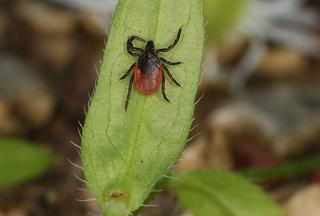
Tick (Photo from Wikimedia Commons, user H.Krisp)
So before you step on a lawn or touch flowers, spray your shoes, feet, trousers/pants and hands with an insect repellant. You can get them in most cosmetics and chemist’s shops (“drogerie” in Czech – for example, Rossmann, Teta, DM). They have the picture of a tick on them. The best one is probably Diffusil. - If you’re renting / buying a house or a flat here, ask local people about
the neighbourhood. They’ll have the best information on how safe it is.
By the way, it’s better to choose a house that isn’t right next to a river. Some of our rivers love floods :-) That’s why the National Theatre is on the riverside – Czechs collected money for it among themselves and it was only enough to pay for a cheap lot near the river.
Paying, Restaurants
- In the centre of Prague, always look carefully at the exchange rate, at the price (in souvenir shops, public toilets…) or agree on the price beforehand (in a taxi). And try not to look absent-minded or talk to your friends while paying. Some waiters, shop assistants, taxi drivers, currency exchange owners etc. have this weird notion that foreigners exist solely for the purpose of letting themselves be ripped off. If they argue with you, tell them you will call the police or your embassy.
- We have some nice waiters and some unpleasant ones. So if you want to be 100% sure you will get a nice waiter, read some info on the restaurant beforehand.
- After finishing your meal in a restaurant, it’s customary to ask for the receipt and give the money directly to the waiter. Pay the waiter some 5% more than the actual price—that’s his gratuity. Most Czechs simply round the sum up: when the waiter tells them the meal was 190 Czech crowns, they give him 200 and say “that’s OK” (meaning, “keep the change”).
Language
-
If you know Russian, Croatian or another Slavic language, be careful.
Some words that are similar to other Slavic words actually have a different,
even opposite, meaning. (When I was living in Latvia, I received my credit
card from a Latvian bank and there was a note saying “Please remember this
PIN” in Latvian, English and Russian. I thought the Russian instruction was
to forget the PIN!)
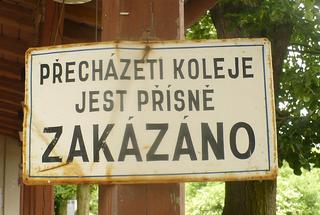
“It is strictly forbidden to cross the railway tracks”, a sign in lovely old-fashioned Czech. The word “zakázáno” means “forbidden”, but if you know Russian, you might think it means “booked” or “ordered”! :-) - In tourist-friendly places (Prague, Kutná Hora, Český Krumlov, Karlovy Vary), most people speak some English or German. But unfortunately, it’s possible that if you walk into a post-office or a railway station, the clerks there won’t speak English. They aren’t very well-paid jobs, so mostly people who don’t speak any foreign language take them. You’re best off writing everything on a piece of paper: Something like that. They will understand.
- If you hear someone speak Czech and suddenly, they say “fuck”, they’re not being rude. That’s how we pronounce the word “fakt”, which means “really” in everyday language :-D
-
In every textbook, you’ll find the information that “yes” translates as
“ano”. Unfortunately, outside of business and diplomatic environment, nobody
uses this word. Instead, we say “jo” (pronounced as “yoh”) or even “no”
(pronounced as “noh”). “No” as positive—confusing, isn’t it? Perhaps
try imagining that the person is saying “nod”.
(The real “no” is “ne” in Czech.) - Don’t say “Czechoslovakia” instead of “the Czech Republic”, and don’t say it belonged to the Soviet Union. People might get really mad at you. Czechoslovakia ceased to exist in 1993, and it never belonged to the Soviet Union. You will read a lot about “the Soviet Union occupation of Czechoslovakia in 1968”, but that just meant Soviet tanks arrived here, so that we might not get any ideas. But we remained independent.
Thanks for your patience :-)
Last but not least, I’d like to recommend user Carminerodi’s article “10 things I wish someone told me before I moved to Prague” :-)
It’s not 100% true, and it’s not meant to be—it’s satire. Some of the things he mentions are only true about Prague. And he’s not so right about Prague being the only city in the Czech Republic—nowadays, Brno and Ostrava, and partly Plzeň and České Budějovice are also cities where you could spend a full life without ever leaving them.
But I simply love the article. It has spot-on observations and it’s great fun to read!
